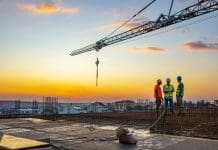We in the offsite sector are on the brink of revolutionising the way we build forever. By using the best in digital technology, offering the built environment in the virtual world, and reducing defects with immense tolerances, the sector is manufacturing incredibly sustainable buildings
These days, the benefits of offsite construction are so well recited that, I don’t even need to justify it with an introduction anymore. With report after report stating the benefits of offsite. From 1934, when Alfred Bosom arrived in America and was exasperated by how slowly we construct our skyscrapers to the most recent, Marker Farmers – Modernise or Die. What more do the government need to make firm commitments to drive the sector forward? And why is the uptake of offsite technologies taking so incredibly long?
Government position on offsite construction
Back in 2017, five government departments had, committed to a ‘presumption in favour of offsite’ methods of construction by 2019.

According to the figures acquired by construction news, out of the five departments three have not awarded one single contract using any offsite technologies in 2019. The Ministry of Justice has awarded one contract so far this year. This contract was awarded to Kier for the HMP Wellingborough build, which has been designed using a DfMA or kit of parts approach. The solution will deliver a higher quality of the product, in less time.
Secondary school pupil numbers are set to rise significantly, 435,000 pupils will be entering secondary education by 2020/21, which means we will need over 400 new schools within the next three years. So, it is reassuring The Department for Education (DfE), at least, is one part of government that is leading the way. With several offsite framework agreements in place, it has procured 22 new offsite contracts this year.
Within a week the Housing and Communities Minister Esther McVey promised £38m to six local authorities to deliver 2,072 homes across England. The government has also invested £30m in ilke Homes to ramp up the production of 5,000 homes over five years. Whilst this is great publicity with a possible pending election, there is a long way to go.
The recently published Housing, Communities Select Committee report, called for local authorities to start building homes in far greater numbers than they have done in recent years. If the 300,000 target is to be reached the select committee says local authorities must supply “a significant proportion” of these homes.
Private sector stance on offsite
Amongst all the noise and seemingly empty promises from the government in the public sector, the private sector is gaining confidence with huge financial backers and continually moving forward on a positive course.
SME developers such as Innerspace Homes are entering the market with poise and purpose, leading their march with design-led sustainable homes with a dash of customisation.
Lesko Homes, manufacture nHouse and ZEDPods. nHouse is again an inspiration design-led, sustainable branded home builder.
Urban Splash, riding on the back of acquiring SIG’s modular manufacturing plant, has now created a deal with one of the most awesome manufacturers in the world, Sekisui House! What’s more, this deal is also backed by the UK Government’s Home Building Fund, administered by Homes England.
TopHat, an exciting modular start-up, has recently seen huge support from Goldman Sachs, one of the largest investment banking enterprises in the world. It has established itself as an emerging giant with huge financial backing.
The announcement earlier this year that ilke Homes has secured a 750-home deal with Places for People, attracted prime time BBC news coverage. Again, Homes England has provided support for this deal.
We also have Boklok, co-owned by IKEA and Skanska, which has an agreement to manufacture flat-pack homes for Worthing Council and 200 for Bristol City Council.
Based in the West Midlands, Totally Modular are an ambitious SME winning over the local authorities building engineered volumetric homes. Totally Modular’s focus is building houses and flats for the social and affordable sectors.
OSCO Homes has been building steady and strong for several years now. Spotting the market gap very early and now emerging in the panelised residential sector.
More recently, Laing O’Rourke’s recent announcement that it is opening its £150m offsite factory for outside use might have come at a good time for its rivals if offsite technologies are about to reach a tipping point.
The offsite momentum
Each of these housing products offers the green answer the government are shouting about. The factories are employing local labour and developing the next generation of workforce. They all have beautifully designed sustainable homes offering a solution to the housing crisis.
The momentum is unstoppable. Offsite manufacturers are creating opportunities, fusing their base of talent and technology, and will enjoy a competitive advantage over those lagging behind with an outdated mindset.
We as an industry would like to make it very clear to government, we are open for business and it is essential we collectively work together to change the way we deliver our buildings of the future.
Gaynor Tennant
CBDO
Tel: +44 (0)0330 113 1975
Twitter: @Modularize
LinkedIn: Modularize

















